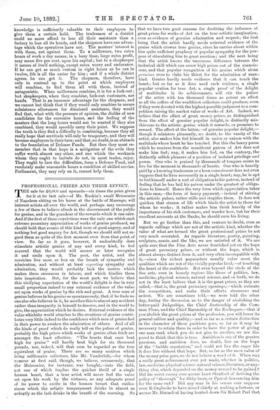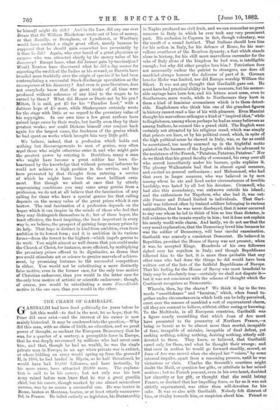PROFESSIONAL PRIZES AND THEIR EFFECT.
THE sale for 26,0€0 and upwards—six times the price given for it at its last sale—of Mr. Ruskin's small Meissonier of Napoleon sitting on his horse at the battle of Marengo, will interest artists all over the world, and perhaps may encourage a few of them to believe afresh in the discernment of the public for genius, and in the grandeur of the rewards which it can ern. And if the first of these convictions were the only one which such extreme pecuniary appreciation of works of genius produced, we should hold that events of this kind were of good augury, and of nothing but good augury for Art, though we should still not re- gard them as quite of the first moment even from that point of view. So far as it goes, however, it undoubtedly does stimulate artistic genius of any and every kind, to feel assured that the world will sooner or later recognise it and smile upon it. The poet, the artist, and the musician live more or less on the breath of sympathy and admiration, and without at least expecting sympathy and admiration, they would probably lack the motive which makes them strenuous in labour, and which kindles them into inspiration. But, for the most part, we believe that this vivifying expectation of the world's delight is due in very small proportion indeed to any external evidence of the value set upon works of genius by the rich and great. A true man of genius believes in his genius so spontaneously, that, if he finds no one else who believes in it, he ascribes this to almost any accident rather than incapacity in himself to deserve, and in the world to give, the appreciation which he desires. External evidence of the value whichthe world attaches to the creations of genius contri- butes very little indeed to the confidence which men of genius feel in their power to awaken the admiration of others. And of all the kinds of proof which do really tell on the pulses of genius, probably the high prices which works of genius often fetch are amongst the least effective. "The hearts that once beat high for praise" will hardly beat high for six thousand pounds, nor, indeed, will that sum be regarded as the true equivalent of praise. There are so many motives which bring millionaire collectors, like Mr. 'Vanderbilt,—for whom rumour at first said, though, we believe, erroneously, that the Meissonier, for instance, was bought,—into the field, not one of which implies the quicker thrill of a single human *heart, that a true artist will never feel the value set upon his work by the virtuoso, as any adequate proof of its power to excite in the human breast that enthu- siasm which the artiatic temperament drinks in almost as ardently as the lark-drinlp in the breath of the morning. So that we have two good reasons for doubting the influence of. great prices for works of Art on the true artistic imagination, even as evidence of genuine admiration and respect; the first being that the artist hardly needs external evidence of the praise which crowns true genius, since he carries about within him quite sufficient prophecy of popular sympathy for the pur- pose of stimulating him to great exertion ; and the next being, that the artist knows the .enormous difference between the technical skill which can screw high prices out of the connois- seur, and that popular recognition of his genius which alone promises even to slake his thirst for the admiration of man-, kind. Genius hardly needs evidence that it can touch the heart ; but so far as it does need such evidence, a single popular ovation for true Art, a single proof of the delight of multitudes in its achievements, will stir the pulses of the artist with ten thousand times as potent an effect as all the coffers of the wealthiest collectors could produce, even.- if they were devoted with the highest possible judgment to a com- petition raising the market value of works of Art. Indeed, we, believe that the effect of great money prizes, as distinguished, from the effect of genuine popular delight, is distinctly mis- bhievous to the artistic genius which it rewards, or promises to reward. The effect of the latter,--of genuine popular delight,— though it ministers pleasantly, no doubt, to the vanity of the, artist, also nukes him feel himself in union or unison with the multitude whose heart he has touched. But this the heavy purse which he receives from the munificent patron of Art does not make him feel; nay, it makes him feel, on the contrary, the distinctly selfish pleasure of a position of isolated privilege and' power. One who is praised by thousands of tongues seems to live for the moment in thousands of hearts. One who is heavily paid by a knowing tradesman or a keen connoisseur does not everr suppose that he lives necessarily in a single heart; nay, he is apt' to feel himself under a sort of obligation to his patron, instead of feeling that he has laid his patron under the greatest of obliga- tions to himself. Hence the very form which appreciation takes in this case,—the form of heavy payment,—instead of stirring. the artistic pulses, rather stills and stupifies them. It does not quicken that stream of life which binds the artist to those for whom he works ; it rather makes him think heavily of the importance of his rich customers, and wonder how, but for their excellent accounts at the Banks, he should earn his living.
But we go further than this, and venture to doubt, even as regards callings which are not of the artistic kind, whether the value of what are termed the great professional prizes be not very much overrated. As regards literature, poetry, painting,. sculpture, music, and the like, we are satisfied of it. We are. quite sure that the Fine Arts never flourished yet on the hope. of great pecuniary prizes, or without the hope, which is. almost always distinct from it, and very often incompatible with it,—since the richest paymasters usually value most the qualities which are not of the vividly popular kind,—of touching. the heart of the multitude. But even beyond the circle of the fine arts, even in homely regions like those of politics, law,, medicine, physical science, natural science, and so forth, we du not in the least believe that it is the great prizes, as they are called,—that is, the great pecuniary openings,—which animate. the competitors, and make their efforts strenuous and- ardent. We are sometimes told,—we were told the other day, during the discussion as to the danger of abolishing the better-paid Judgeships, the Chief Justiceship of the Com- mon Pleas, and the Chief Baronship of the Exchequer,—that ii you abolish the great prizes of the profession, you will lower it general calibre and quality ;—and so far as a certain distinction in the character of these positions goes, so far as it may be necessary to retain them in order to have the power of giving one man rank which you do not give to another, we are dis- posed to think that this is true. Ambition is one of the greaten passions, and ambition does, no doubt, live on the hope of the "bubble reputation," and could not live the eager life it does live without that hope. But, so far as the mere value of the money prize goes, we do not believe a word of it. When was- a really great achievement ever yet made, whether in politics, law, medicine, physical science, natural science,literature, or any- thing else, which depended on the money reward to be gained P Did his worst enemy ever accuse Lord Strafford of devising the policy of " thorough for filthy lucre, or Pym of denouncing him for the same end ? Did any man in his senses ever suppose even Bolingbroke to have aimed chiefly at rnaking.a fortune, or accuse Mr. Disraeli of having hunted down Sir Robert Peel that
he himself might die rich ? And in the Law, did any one ever dream that Sir William Blackstone wrote out of love of money, or that Romilly, or Brougham, or Lyndhurst, or Westbury would have omitted a single great effort, merely because he supposed that he should gain somewhat less pecuniarily by it than he did? Again, who ever heard of a great physician or surgeon who was attracted chiefly by the money value of his discovery? Except fame, what did Jenner gain by vaccination? Would Newton have discovered what he did a day sooner for expecting the wealth of the Indies as his reward, or Darwin have brooded more fruitfully over the origin of species if he had been contemplating a successful Stock-Exchange speculation as the consequence of his discovery? And even in pure literature, does not everybody know that the great works of all time were produced without reference of any kind to the wages to be earned by them ? What did Homer or Dante net by his pen ? Milton, it is said, got £5 for his "Paradise Lost," with a dubious hope of £5 more, while Shakespeare certainly wrote for the stage with little or no regard to the pecuniary value of his copyrights. In our own time a few great authors have gained large sums by their works, but hardly even they by their greatest works ; nor could Dickens himself ever conjure back again for the largest sums, the freshness of the genius which he had spent on works which brought him very little gold.
We believe, indeed, that a profession which holds out nothing but discouragements to men of genius, may often zepel those who might otherwise enter it, and who might gain the greatest power by entering it. Doubtless, many a man who might have become a great soldier has been dis- heartened by the knowledge that without personal influence he could not achieve a high position in the service, and, has been prevented by that thought from entering a service of which he might have been the most brilliant orna- ment. But though we admit at once that by utterly unpromising conditions you may scare away genius from a profession, we do not at all believe that the fascination of any calling for those who have a special genius for that calling depends on the money value of the great prizes which it can bestow. The real fascination of a profession depends on the hopes which it can inspire in the minds of those who feel that they may distinguish themselves in it; but of these hopes, the least effective, the least inspiring, the least important in every way is, we believe, the prospect of gaining large-money prizes by its help. That hope is distinct in kind from ambition, even from ambition in its lowest form ; and it is ambition in its various forms—from the lowest to the highest—which impels genius to its work. You might almost as well dream that you could make the Church of Christ, for instance, more efficient, by multiplying the pecuniary prizes offered to its dignitaries, as dream that you could stimulate art or science to greater marvels of achieve- ment, by promising fortunes to thk successful competitors in either. You would not be substituting a more distinctly false motive, even in the former case, for the only true motive of Christian endeavour, than you would in the latter case for the only true motive of artistic or scientific endeavour ; though, of course, you would be substituting a more discreditable motive in the one case, than you would in the other.





































 Previous page
Previous page